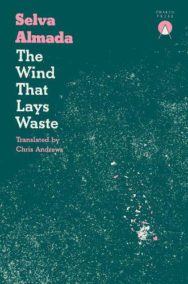‘The tensions between them grow just as the thunderstorm brews on the horizon, and we’re all waiting for it to come and clear the air – which it does, in a surprising and emotional climax.’
Charco Press have been translating and publishing gems from South America for only two years, and yet have been gaining fans with each new publication. Alice Piotrowska takes a look at their latest release, Selva Almada’s The Wind That Lays Waste.
The Wind That Lays Waste
By Selva Almada, translated by Chris Andrews
Published by Charco Press
Reverend Pearson is on a mission from God. Accompanied by his slightly resentful and mostly reluctant teenage daughter, Leni, he drives across northern Argentina to convert lost souls into followers of Christ. When their car breaks down in the middle of a desert despite Pearson’s unwavering faith (‘The car won’t let us down. The good Lord wouldn’t allow it’), they end up in the workshop of Gringo Bauer and his assistant Tapioca, whose impressionability and ‘pure soul’ seem to Pearson the perfect mission target. Translated from Spanish by Chris Andrews, The Wind That Lays Waste by Selva Almada is a distinctive debut: atmospheric, tension-packed, and written in vivid, poetic language.
The story is set in one location – a remote car workshop – and happens over a single hot afternoon. The ‘scorching sun’ and deserted landscape are almost tangible through Almada’s writing: the world comes to life with a skirt ‘sticky with sweat,’ the ‘solitude of a cotton field,’ a heat-exhausted dog swishing its tail under the table. This is elegant, compact prose, where every description has a well-thought-out place in the narrative. Pearson’s evangelistic quest, for instance, is repeatedly associated with the act of washing and purifying with water – he’s here ‘to wash dirty souls, to make them sparkling clean again’ – conveying his own baptism story, where ‘the river man plunged him into the filthy waters of the Paraná to lift him out again, purified.’ (The contrast between Pearson’s sincere spirituality and the practical minds of the people around him is often genuinely funny. While he remembers his baptism as a formal, life-altering event, his mother ‘just thought [she] would bring him to the river – “I heard on the radio that the Preacher was coming, and I thought I’d go and see what it was about . . . ” His mother laughed as if remembering a prank.’)
These shifts in tone stem from the novel’s multi-perspectivity and Chris Andrews does an excellent job with the English translation, capturing the vivid descriptions and these smallest shifts in tone. Almada changes the point of view every few paragraphs, giving equal attention to all four characters (aside from one chapter where the narrative switches to Bauer’s dog, zeroing in – for good reasons – on its sense of smell). What could become cumbersome in a longer book with multiple settings, works perfectly for this tight and character-driven plot – it gives complexity to the characters and meaning to their actions. It would be easy, in a novel of this length (The Wind That Lays Waste is barely more than a hundred pages), to opt for cut-and-paste characters that can be summarised in a couple of words: a spiritual preacher, a down-to-earth mechanic, a rebellious teenager. Instead, each person is more than he or she seems; the plot is propelled by backstories and motivations that we learn about as we go along. The relationships are similarly complicated; Leni ‘admired the Reverend deeply but disapproved of almost everything her father did. As if he were two different people.’
With this focus on the interactions between the characters, especially paired with the single setting, I often felt that the book could be brilliantly adapted for theatre – a suspenseful God of Carnage-like play where civilised discussions gradually turn sour and finally end in a (literal and metaphorical) storm. As cliché as it sounds that the weather reflects the action in the book, it is a crucial part of Almada’s worldbuilding. For the first half of the novel, everyone seems suspended in the pause before the storm: dozing off, sipping on beer, and engaging in small talk while they try to survive the stifling heat. Nonetheless, the tensions between them grow just as the thunderstorm brews on the horizon, and we’re all waiting for it to come and clear the air – which it does, in a surprising and emotional climax.
A word on translation – and why Charco Press does it so right. By now most people have probably heard of Charco, an Edinburgh-based company that publishes contemporary fiction from Latin America, or at least about some of their books – last year, Die, My Love by Ariana Harwicz (translated by Sarah Moses and Carolina Orloff, the company co-founder) was longlisted for the Man Booker International. In a past issue of Books from Scotland, co-founder Samuel McDowell talks about Charco’s approach to publishing works in translation:
A second part of our mission is to bring the very important role of the translator to the fore. It is an art form unto itself and deserves much wider recognition than it currently receives.
All Charco translators are named on the jackets alongside the author. Instead of subtly obscuring the fact that a book has been translated, Charco recognise the work and talent that goes into making a story accessible to a different audience without losing the distinctive style of the original. This is a brilliant mission to have and, hopefully, one that other publishers will follow.
The Wind That Lays Waste by Selva Almada is translated by Chris Andrews and published by Charco Press, priced £9.99
ALSO IN THIS ISSUE

 David Robinson Reviews: Books on Pilgrimages
David Robinson Reviews: Books on Pilgrimages
‘We set out only to come back again, and every departure involves a return until we make the pilgrim …

 The Best of Crime Fiction 2019, So Far . . .
The Best of Crime Fiction 2019, So Far . . .
‘The trick was confidence. You can get away with anything if you act like you know what you’re doing …













